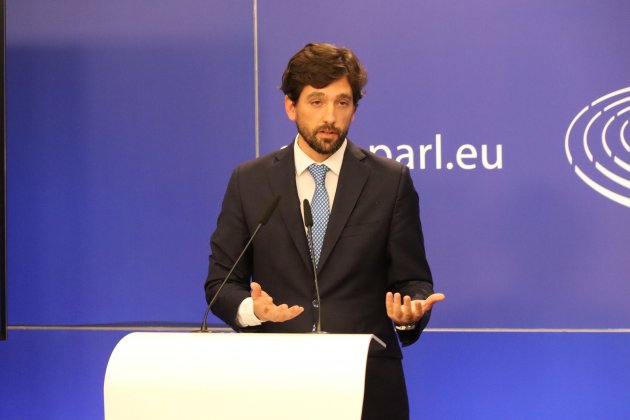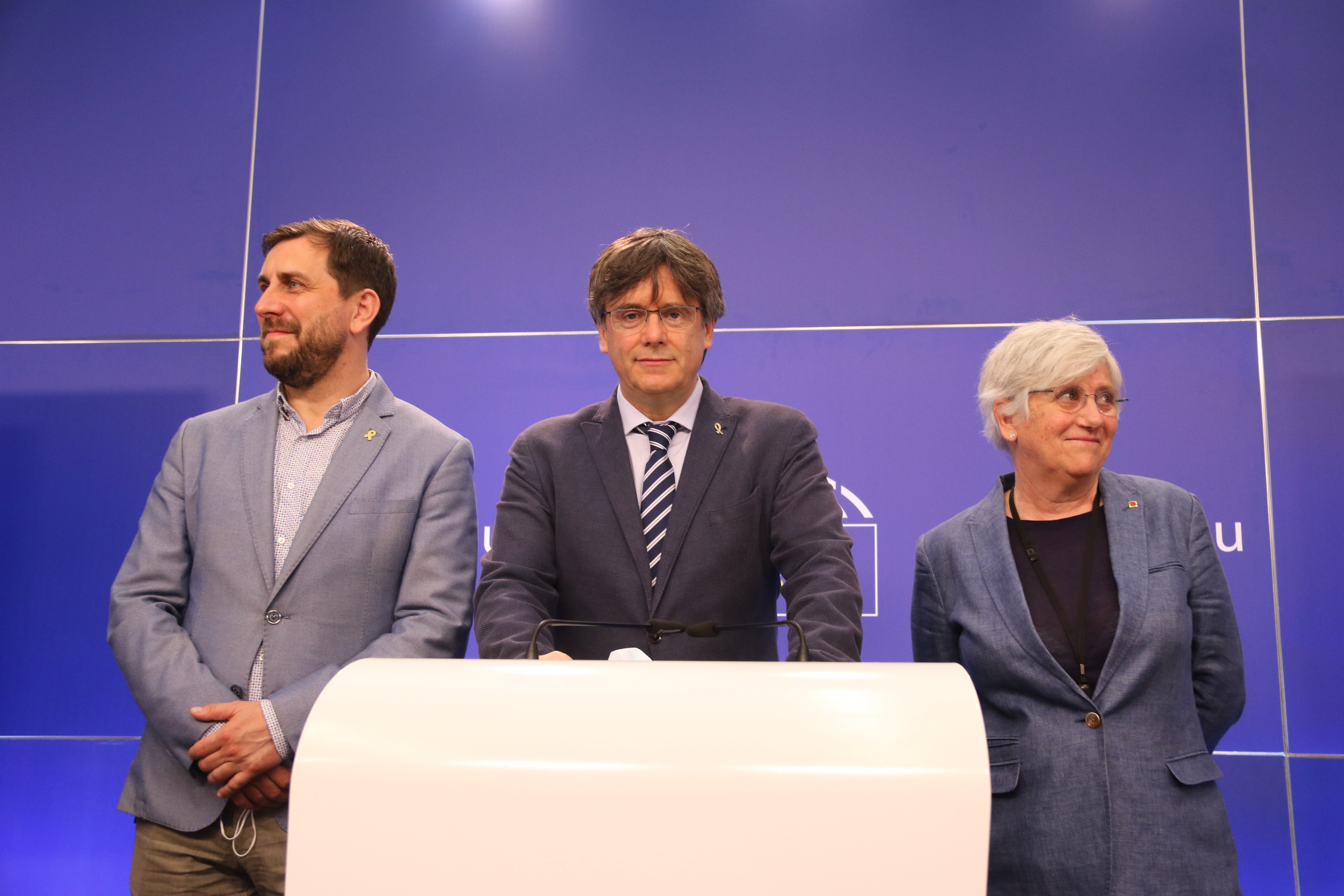A new judicial battle in Europe. The Catalan MEPs in exile Carles Puigdemont, Toni Comín and Clara Ponsatí are to denounce that Spanish PM Pedro Sánchez aims to arrest and imprison them through the announced reform of Spain's Penal Code and the abolition of the crime of sedition, during the hearings that are scheduled before the EU General Court (EGC) on November 24th and 25th. In other words, they complain that what is to be applied to them is the "criminal law of the enemy" concept, defined by jurist Günter Jakobs, under which legal guarantees are relaxed in order to pursue an opponent of the state, as has been shown to have occurred in the case against the Catalan independentists. In the two court sessions in Luxembourg, the MEPs' lawyers, headed by Gonzalo Boye, will defend the immunity of the three Junts MEPs, and will call for the annulment of the lifting of this protection to hand them over to the Spanish state, as their fundamental rights have been violated.
The judgments of the EGC, which are expected two months after the hearings, are another part in the legal case being assembled by the defence of the exiles. However, a key element will be the ruling of the high court in Luxembourg, the European Court of Justice (ECJ), on the preliminary questions presented by Supreme Court judge Pablo Llarena on whether an EU country can enter into the substance of a another country's case (given that Belgium refused to hand over the exiled Lluís Puig, on the grounds that his rights could have been violated) and whether a European Arrest Warrant for Puigdemont can again be presented. It would be the fourth. The decision of the ECJ is expected at the end of this year, but could be delayed until next March. If Puigdemont, Comín and Ponsatí win immunity in the EGC, they might consider returning to Spain, according to their defence team. However, it remains to be seen whether the Supreme Court would respect their immunity or, alternatively, simply arrest them when they set foot in Catalonia.
Contradictions: the Electoral Commission and the Constitutional Court
More than the reform of the Spanish Penal Code itself - announced last week, after being agreed by the PSOE and Podemos and accepted by their allies ERC, with the disappearance of the crime of sedition and the introduction of a new crime of aggravated public disorder - Gonzalo Boye will set out to the EGC judges the political persecution of Puigdemont expressed in statements by members of the PSOE-led Spanish government that they intend to effectively hunt down president Puigdemont, since if a reform of this type is proposed, it must be for the benefit of society as a whole. These controversial statements by Pedro Sánchez and his team will be added to the presentation of the changes in the definitions of Spanish criminal offences that have been made since 2017 to pursue Catalan independence supporters: the crimes of rebellion, sedition and now aggravated public disorder and possibly misuse of public funds.
Boye will set out not only this persecution, but also how Spain's Central Electoral Commission (JEC), in its statement to the European Parliament, did not respect the decision of the ECJ in the well-known Junqueras case, in which it determined that an MEP assumed the status of office when elected, and not after carrying out the Spanish demand of swearing on the Constitution. And he will also look at the recent resolution of Constitutional Court, of which only the bare response has so far been communicated, which is that Spain's court of guarantees, in opposition to the opinion of the JEC, considers that Puigdemont, Comín and Ponsatí are indeed MEPs.
Statements by the Socialist government
With regard to government statements that are controversial, prime minister Sánchez affirmed last Thursday on La Sexta network, as part of the interview in which he announced the reform of the crime of sedition, that despite the changes to the Penal Code, Puigdemont would "absolutely" have to answer to Spanish justice, given that "the crimes that were committed in 2017 are still present in the Penal Code" despite the change in name. He reiterated this idea three days later, in an interview with La Vanguardia in which he reiterated that Puigdemont committed crimes in 2017, for which, despite the reform of the Penal Code, he would have to answer. "Of course, the crimes will not disappear. Carles Puigdemont, when he has to appear, and he will appear, I am convinced of that, before Spanish justice, will have to answer for the crimes committed in 2017."
The first deputy PM, Nadia Calviño, went even further and on Tuesday asserted in an interview with Cadena Cope in relation to the reform of the crime of sedition that everyone's goal is "of course" that Puigdemont "will return to Spain and meet his obligations and that he appear before Spanish justice and serve the sentence that he is given". "The difficulty in the extradition is that our criminal definition of sedition does not exist in other countries, it is an important step forward to align it with the countries around us", she affirmed. Even more forceful, however, was the spokesperson of the PSOE in Congress, Patxi López, who boasted from the lectern in the press room of the lower house that the reform of the Penal Code would facilitate the extradition of the exiled pro-independence leaders. López provoked the irritation of the exiled leaders by affirming, using terminology specific to the fight against ETA, that "there will no longer be sanctuaries for those who commit crimes against public order".

The controversial lifting of immunity
The EGC case began on March 9th, 2021 when the European Parliament approved the request to waive the immunity from prosecution of the MEPs Carles Puigdemont, Toni Comín and Clara Ponsatí. All three appealed against the decision and asked that their immunity be restored as a precautionary measure while the court decided on this appeal. That was initially agreed by the judges. However, one month later, on July 30th, 2021, the measure was revoked because the court held that, despite the lifting of the immunity, they could not be arrested because the preliminary questions presented by judge Pablo Llarena on the arrest warrants had left the warrants themselves in abeyance. Then, two months later, Puigdemont was arrested during a trip to Alguer, Sardinia and released. When the hearing was held, the appeal court on the Italian island decided to suspend its decision until the hearing of the claim that Puigdemont has open in the Luxembourg court.
During the long year that has passed since those events, there have been no significant developments in this regard. In fact, the exiles have made regular visits to Northern Catalonia - that is, on the French side of the Pyrenean frontier - without any problems.
And in addition, then, to the facts of the political persecution of Carles Puigdemont, Boye will also endeavour to show the ECG judges that the European Parliament's Legal Affairs Committee, chaired by the MEP Adrián Vázquez of Ciudadanos, which promoted the request to waive the exiles immunity, has a "lack of impartiality". And that their fundamental rights were violated - also by fact that the legal process against the Catalan pro-independence leaders is not being conducted by the judge determined by the law (referring to judge Llarena of the Supreme Court) and, thus, the process has not been correct either.
In the two hearing in the General Court, the parties are the exiles and the European Parliament; while the Spanish state appears as adherents to the former.

